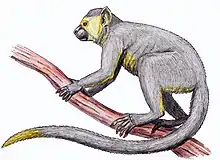Mesopithecus
Mesopithecus ("middle monkey" for being between Hylobates and Semnopithecus in build) is an extinct genus of Old World monkey that lived in Europe and Asia 7 to 5 million years ago.[1][2][3] Mesopithecus resembled a modern macaque, with a body length of about 40 centimetres (16 in). It was adapted to both walking and climbing, possessing a slender body with long, muscular limbs and flexible fingers. Its teeth suggest that it primarily ate soft leaves and fruit.[4] It was once thought that these extinct monkeys might be an ancestor of the grey langur, but a study in 2004[5] suggested that they are more closely related to the snub-nosed monkeys and doucs.
| Mesopithecus Temporal range: | |
|---|---|
 | |
| Skeleton | |
| Scientific classification | |
| Domain: | Eukaryota |
| Kingdom: | Animalia |
| Phylum: | Chordata |
| Class: | Mammalia |
| Order: | Primates |
| Suborder: | Haplorhini |
| Infraorder: | Simiiformes |
| Family: | Cercopithecidae |
| Subfamily: | Colobinae |
| Genus: | †Mesopithecus Wagner, 1839 |
| Species | |
| |
Gallery
 Mesopithecus pentelici skulls
Mesopithecus pentelici skulls_white_background.jpg.webp) Skeletal restoration
Skeletal restoration
References
- Fossils of 6.4-Million-Year-Old Monkey Found in China; on: sci-news; Oct 9, 2020
- Xueping Ji et al.: Oldest colobine calcaneus from East Asia (Zhaotong, Yunnan, China). In: Journal of Human Evolution Vol. 147: 102866; October 2020; doi: 10.1016/j.jhevol.2020.102866
- Jablonski, Nina G.; et al. (6 August 2020). "Mesopithecus pentelicus from Zhaotong, China, the easternmost representative of a widespread Miocene cercopithecoid species". Journal of Human Evolution. 145: 102851. doi:10.1016/j.jhevol.2020.102851. PMID 32771770.
- Palmer, D., ed. (1999). The Marshall Illustrated Encyclopedia of Dinosaurs and Prehistoric Animals. London: Marshall Editions. p. 289. ISBN 1-84028-152-9.
- Pan, Ruliang; Groves, Colin; Oxnard, Charles (2004). "Relationships between the fossil colobine Mesopithecus pentelicus and extant cercopithecoids, based on dental metrics" (PDF). American Journal of Primatology. 62 (4): 287–299. doi:10.1002/ajp.20022. PMID 15085533. S2CID 6688467. Archived from the original (PDF) on 2008-07-27. Retrieved 2009-01-26.
External links
- Rare Mesopithecus skull unearthed in Chalkidiki Archived 2006-10-07 at the Wayback Machine
This article is issued from Wikipedia. The text is licensed under Creative Commons - Attribution - Sharealike. Additional terms may apply for the media files.



